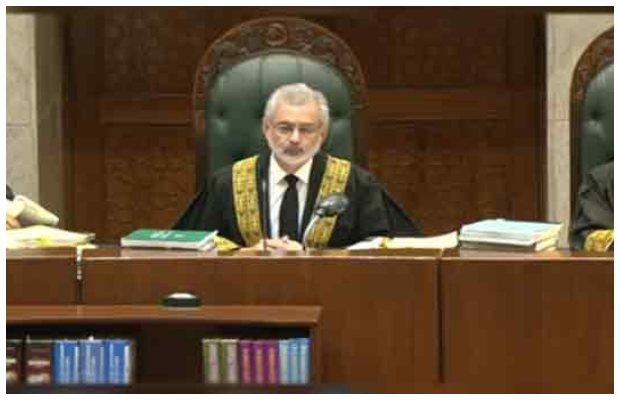Full court upholds Supreme Court (Practice and Procedure) Act 2023
The verdict was announced by Chief Justice of Pakistan Qazi Faez Isa.

The full court upheld the Supreme Court (Practice and Procedure) Act 2023!
Chief Justice of Pakistan Qazi Faez Isa announced the verdict on the Bill limiting CJP powers ‘sustained’ with a -5 majority.
He said that five members of the bench had opposed the law.
The five members of the full court bench — Justice Ijazul Ahsan, Justice Muneeb Akhtar, Justice Sayyed Mazahir Ali Akbar Naqvi, Justice Ayesha A Malik, and Justice Shahid Waheed — had opposed the law.
Reading the reserved verdict, which was streamed live, Chief Justice of Pakistan (CJP) Qazi Faez Isa ruled “By a majority of 9-6 (Justice Ahsan, Justice Akhtar, Justice Afridi, Justice Naqvi, Justice Ayesha and Justice Waheed dissenting) sub-section 1 of Section 5 of the Act (granting a right of appeal prospectively) is declared to be in accordance with the Constitution and to this extent, the petitions are dismissed.
SC full bench headed by CJP Qazi Faez Isa on Wednesday reserved the verdict on a set of pleas challenging the SC (Practice & Procedure) Act, 2023.
Chief Justice of Pakistan (CJP) Qazi Faez Isa on Wednesday said the Parliament was not an enemy of the Supreme Court and both institutions could function simultaneously as the apex court reserved its verdict.
A total of five hearings have been conducted by the full court headed by Justice Isa, the bench consisted of Justice Sardar Tariq Masood, Justice Ahsan, Justice Syed Mansoor Ali Shah, Justice Akhtar, Justice Yahya Afridi, Justice Aminuddin Khan, Justice Naqvi, Justice Jamal Khan Mandokhel, Justice Mazhar, Justice Ayesha, Justice Athar Minallah, Justice Rizvi, Justice Waheed, and Justice Musarrat Hilali.
Supreme Court (Practice and Procedure) Act 2023
The practice and procedure law, which was passed by Parliament in April, states “A three-member bench, comprising the CJP and the two senior-most judges of the apex court, will decide whether or not to take up a matter suo motu. Previously, this was solely the prerogative of the CJP”
Additionally, it adds to the review jurisdiction of the Supreme Court, giving the right to file an appeal within 30 days of the judgment in suo motu cases.






